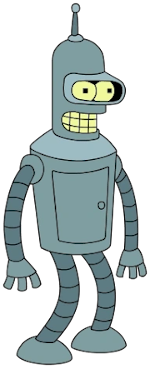In what concerns the continuous evaluation solving exercises grade during the semester, you should submit until 23:59 of December 14th
(this exercise will still be available for submission after that deadline, but without counting towards your grade)
[to understand the context of this problem, you should read the class #09 exercise sheet]
In this problem you should submit a function as described. Inside the function do not print anything that was not asked!
(in this class you are expected to write a solution that uses recursion - mooshak will not force it, but that should be your goal)
[IP086] Binary Communication
 Bender finds himself in a peculiar situation. Due to a temporary glitch in his processing core, he can now only communicate in binary. But there's a catch - his circuits can handle only a limited number of 1's in a message at a time. To avoid overheating, Bender needs your help to generate all possible binary strings of lengths ranging from a to b, inclusive, while ensuring that no string has more than k 1's.
Bender finds himself in a peculiar situation. Due to a temporary glitch in his processing core, he can now only communicate in binary. But there's a catch - his circuits can handle only a limited number of 1's in a message at a time. To avoid overheating, Bender needs your help to generate all possible binary strings of lengths ranging from a to b, inclusive, while ensuring that no string has more than k 1's.
He refuses to write this program himself because he's busy bending things and drinking oil, so it’s up to you to save the day! Help Bender generate his new vocabulary of binary strings.
The Problem
Write a function binary(a, b, k) that returns a list containing all possible binary strings of lengths between a and b, inclusive, with at most k 1's. Each string should consist only of the characters '0' and '1'.
Constraints
The following limits are guaranteed in all the test cases that will be given to your program:
| 1 ≤ a ≤ b ≤ 10 |
|
range to consider |
| 0 ≤ k ≤ 10 |
|
maximum number of 1's |
| Example Function Calls |
Example Output |
output = binary(1, 2, 3)
print(sorted(output))
print()
output = binary(2, 4, 2)
print("output is of type", type(output))
print("output has size:", len(output))
for x in sorted(output): print(x)
|
['0', '00', '01', '1', '10', '11']
output is of type <class 'list'>
output has size: 22
00
000
0000
0001
001
0010
0011
01
010
0100
0101
011
0110
10
100
1000
1001
101
1010
11
110
1100
|
Introduction to Programming (CC1024)
DCC/FCUP - University of Porto
 Bender finds himself in a peculiar situation. Due to a temporary glitch in his processing core, he can now only communicate in binary. But there's a catch - his circuits can handle only a limited number of 1's in a message at a time. To avoid overheating, Bender needs your help to generate all possible binary strings of lengths ranging from a to b, inclusive, while ensuring that no string has more than k 1's.
Bender finds himself in a peculiar situation. Due to a temporary glitch in his processing core, he can now only communicate in binary. But there's a catch - his circuits can handle only a limited number of 1's in a message at a time. To avoid overheating, Bender needs your help to generate all possible binary strings of lengths ranging from a to b, inclusive, while ensuring that no string has more than k 1's.